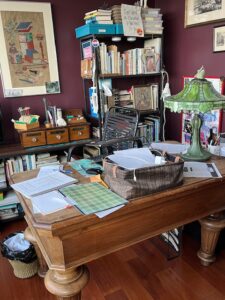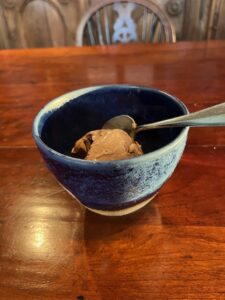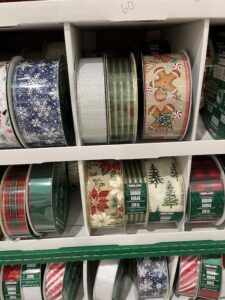 This is the way it begins:
This is the way it begins:
Daylight appears without introduction. A faintness seeps between concrete monoliths. The morning rumble is unleashed. A distant siren weeps and dogs stir.
The heavy covers are warm and I have no urgent reason to rise—except I do.
The list rests on my night table. Pleasant dreams are forgotten; nightmares pollute the temper of the day. I do the slow exercise of standing, dressing, breakfast. I make the bed, brush my teeth, tidy up.
Anxiety evolves.
I sit, not for meaningful work, but to settle pending affairs. The everyday clutter of life should be simple. It used to be.
I’m surrounded by people who’s job is not to answer the phone for me. A digital assistant informs me, “We have no record of that account.” “Sorry, I do not understand your question.”“Please stay on the line. We value your patronage. You are number ninety-seven on our wait list. If you don’t wish to wait, leave your number and we will call you back.”
They never do.
“Take advantage of our easy-to-use. website.”
The site is un-navigable and contains a “help chat” that is cheerful but useless.
When I make contact with a human, I’m sent from department to department. Managers are baffled by my issue. Time runs out. The problem remains unresolved.
Weary and restless, I walk out in the crisp air where bicycles taunt, and the unfortunate remind me of my pettiness and inability to complete simple tasks. Undaunted, I purchase a “gourmet” salad for lunch in celebration of new resolve. I hurry home where fresh and persistent frustrations await. I scroll through 279 emails and delete, unsubscribe, report junk. That, at least, should be satisfying.
It’s not.
I attempt to create a nutritious and engaging evening meal with an indifferent oven, and a mother’s no-fail recipe baked in her prize pan. Despite the power of Mother invoked, I do not succeed.
I attempt to compose a few email pleas that will impress overseers of government and commerce. Expectation wanes in the moonlight.
Ice cream is my solace, peanut butter fudge sauce, chocolate chips, a scattering of nuts as homage to health.
I shower and settle in for cozy tv mysteries, featuring renowned character actors with with accents I only partially understand. I may occasionally doze.
Creativity is squandered on providing missing narrative.
This is the way it ends:
Suspense is spoiled by awareness that a version of this day will repeat itself tomorrow. The killer/spy/thief is rarely who was expected and if it is, disappointment ensues.
I’s time to enjoy uneven sleep until morning sun…
or not.
 Lost summer days pass quickly.
Lost summer days pass quickly.
And I don’t mean that in a good way.
Three knotty problems loomed over resolve: a snarled legal issue, a dull insurance matter, and impending credit card fraud. None of these could be handled over the internet (as recommended). Phone calls were made, transfers achieved, information foraged and checked, rechecked. Passwords were changed, codes sent, emails confirmed. In between we made our way to the grocery store, assembled food, partook of caffeine, and took naps. All the while workmen drilled and hammered on the outer wall of our dwelling in order to comply with “Local law 11.”
Days like this seem to occur more often. I’m told to reduce stress—the gods are amused. Exercise is difficult amidst workmen, extreme heat, and harmful air quality. Meditation? The monkey brain says “no, just no.” Television is a frightening mix of grim news and dark storytelling. Books, my old reliable escape, become problematic distractions under duress.
Comfort and ease are elusive. Surprise has taken on a dire aspect.
Where is the celebratory cake?
The found money?
The message from a long lost friend?
I take solace in the fact that my white Keds came (somewhat) clean in the washing machine, as recommended by YouTube. That my glasses have been found despite the fact that they now fall off my face when I look down because my husband mistakenly wore them. That a neighborhood butcher sets aside generous bags of dried hibiscus for tea, and sells them at an affordable price; and that I have a neighbor good enough to pass along that secret.
The bowls that I eat out of when I’m gloomy are handmade and glazed with subtle colors amidst confusion. They make me feel secure and hopeful. The world revolves in chaos about these small works of art and rids my thoughts of all, save sense of taste and satisfying tactile feel of their irregular surface and heft.

I don’t like Sundays. I’ve never liked Sundays. The devout are made pious. The sinners plot their next transgression. Heavy Sunday food caries the curse of daylight drowsiness and if you nod, time passes at an uneven pace. It interrupts your night sleep, leaves you exhausted and unprepared for the work week.
Sunday doldrums sneak up on you after a busy Saturday and festive evening. The news summarizes the disasters of the past week, the daunting intent of the week to come, the futility of impossible hopes, the relentlessness of Time.
Sunday’s children “full of grace” or “ blithe and good” assert their dominance over lesser creatures like ourselves. They gird us into resistance. They undercut the peace.
In the drowsy atmosphere of Sunday afternoons, I sleep too profoundly—or too shallowly. I dream too deeply. I awake befuddled.
I’m happy when the onset of the new week unleashes it’s dominance.
When I was a child, my family would often go for “a drive” on Sunday, up the mountain for fresh air and Nature. I had no siblings to cavort with, no friends willing to be confined in a car on an aimless journey, with geeky grown-ups controlling the radio station. Sometimes we’d drive to a small airport to watch planes take off. This was my father’s idea of excitement, not mine. It wasn’t that I didn’t dream of embarking on an adventure far from my small town and modest life like an airplane ascending into the unknown, but this was a dream too monumental for a stifling Sunday, and it was too frustrating to watch others test their wings.
I do not like Sundays.
